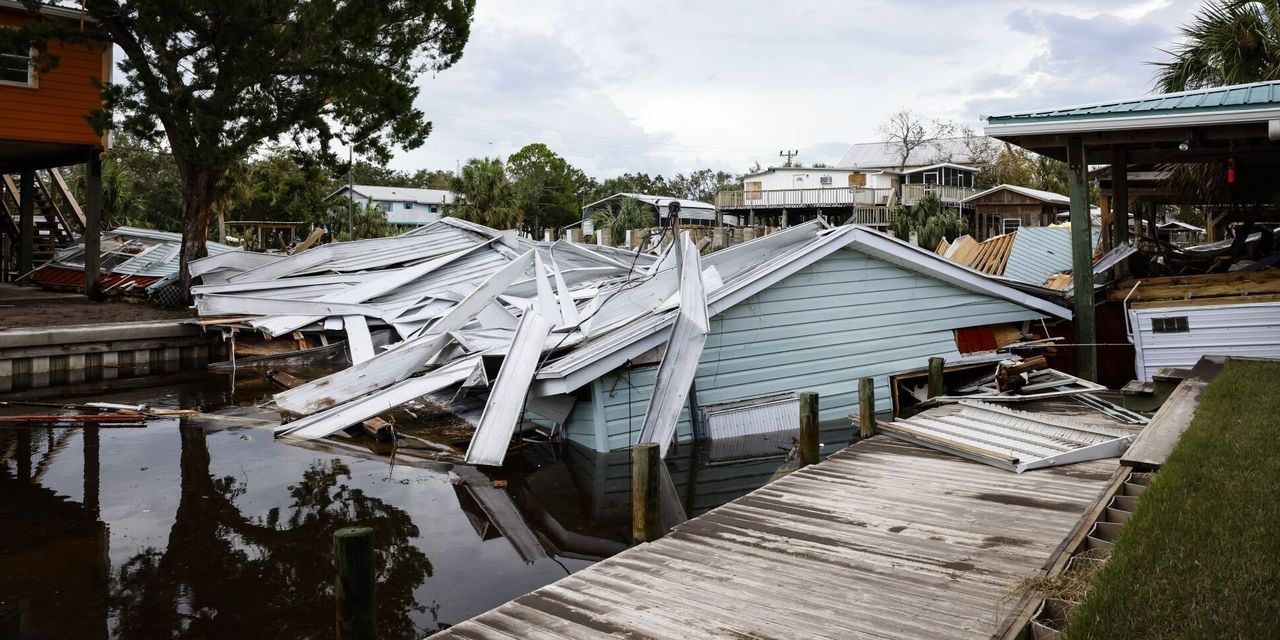Huge losses from national disasters prompt industry to jack up prices and pull back from some markets; ‘worst possible scenario’ for consumers
After Allstate suffered billions of dollars in losses and failed to get the rate increases it wanted, it resorted to the nuclear option.
The insurance giant threatened last fall to stop renewing auto insurance for customers in three states that hadn’t given in to its demands, which would have left those policyholders scrambling for coverage. The states blinked.
In December, New Jersey approved auto rate increases for Allstate averaging 17%, and New York, a 15% hike. Regulators in California are allowing Allstate to boost auto rates by 30%, but still haven’t decided on its request for a 40% increase in home-insurance rates after the insurer refused to write new policies.
For many Americans, getting insurance for both their cars and homes has gone from a routine, generally manageable expense to a do-or-die ordeal that can strain household budgets.
Maybe it’s time for a state to start a nonprofit insurance fund? Insurance companies exist only for profit, which is antithetical to the point of insurance.
You egomaniac! Don’t you ever think of the shareholders? Monster!
This doesn’t address the core issue, that the math simply doesn’t work in several places. Even ignoring profit, at the very least, you have to balance your payouts with your premium revenue, and if your payouts are so high that premiums must be higher than what people can afford, then you’re toast.
Or you invoke government subsidies, in which case it’s essentially a tax to subsidize people’s poor decision making. At the end of the day, living in an area extremely prone to fires or flooding has real costs, and either somebody pays them, whether that be the individual, an insurance pool, or the government, or you simply stop incurring the cost by moving somewhere else (there’s a strong argument for some amount of government assistance here)
I’m not suggesting we stop at nonprofit insurance. We can use the data so states can determine regions that are unfit for human habitation, which will become necessary due to climate change. A state-ran insurance could still have risk pools as well for matters like house and car insurance, without nonsense like charging charging more for owners of red cars.
I mean, there’s no mystery here. You can literally just look at the regions that home insurers have been pulling out of to get a pretty good start. This data already exists. Collecting and processing that data is literally the primary thing that insurance companies do.
If a company whose sole purpose is extracting every bit of profit they can is deciding that insuring an area is not feasible, that probably says something. The inevitable, but obviously unpopular, answer is that there are some places where people moving there need to do so at their own risk, because it’s not fair for them to throw these fundamentally unnecessary high costs on other people. Minus a small adjustment to account for how state insurance doesn’t need profit and so can operate at zero margin, the structure of the insurance doesn’t really make a difference here.
People moving into areas of high risk are only a tiny portion of the problem. The existing owners, and their kids, are already too much risk for a lot of places. Hundreds of thousands of retiree’s already live in beach front condos that have been there for 30 years or more, and they have no way to move. There are millions more in similar places, that just have to accept whatever happens to them, because they have no resources to move, and a fixed or non existent income.
That problem is going to be the biggest one when dealing with climate change as a species. Moving hundreds of millions of people, who can’t afford to move, to places that don’t want them to move there. Interspersed with random natural catastrophes causing horrible loss of lives and resources.
While sea levels rising may be something that someone 30 years ago didn’t predict, most of the other risks were well known 200 years ago.
I have always thought that the people you are talking about should be able to get insurance, maybe even at a reasonable rate, but if/when a natural disaster occurs the insurance payout should be for a property/place not in a high risk zone rather than rebuilding, and that land should then be disallowed for human habitation.
Basically a compromise of sorts. I’m sure someone will tell me why I’m wrong though, lol.
In some places that’s exactly what has been done. Usually the government uses eminent domain on the land rather than allow reconstruction. The problem being the cost. Most cities and states would have nowhere near enough money to move a fraction of the homes in danger, or even pay for their relocation when they’re destroyed.
Replace climate with war and this is how refugee groups have lived for centuries. Life doesn’t always work out, bad choices can have very long timelines and there’s likely zero way to bail everyone out, even with the most altruistic of motives.
Bailing them out might not work at scale but ensuring they have somewhere to live when things get too hot, literally and metaphorically speaking, is feasible and will prevent the negative consequences of millions of displaced people.
You’re absolutely right. This is a problem that requires some amount of direct government assistance. Beachfront housing is significantly more costly than people think it is and than it used to be, and it’s only going to get worse. If you can’t afford regular repairs after storms (or if a collectively relevant insurance pool can’t), you can’t afford to live there, and for people who are already there and can’t afford to easily get out, some government assistance is more than warranted.
I don’t think that there is an inherent link between profit and safety, so I’m hesitant to call their data useful for determining where a place is safe to live. Maybe useful for determining risk pools, but not for determining safety. There are places that should not be habitated, but it shouldn’t be determined by capital interests.
I’m not talking about raw safety. I’m referring to the situation where the average costs a resident of the area will incur due to environmental damage surpasses the amount an average person is willing to pay in insurance premiums. In these kinds of areas, insurance in inherently unworkable, regardless of profit seeking or not (again, minus a minor adjustment in margins)
In these places, you can either add in external subsidies to make the numbers work, which is bound to be unpopular with the people having to pay extra money to support people choosing to incur unnecessary costs, or you can accept that there is no workable insurance scheme in the area that and residents must take account of their own risks. There’s no real way around this basic reality.
This isn’t about safety - those places are safe to live most of the time, and the weather predictions are very good at giving you a week notice to get out before the exceptions.
It is just too expensive to have buildings in those areas. Nobody builds a house that can be moved away from those areas in a week. Thus if you live there you need to account for the costs of rebuilding your house every few years when the weather destroys it. Or you need to build a house that can survive the weather - I don’t know how expensive that would be.
I don’t care if you want to live in those places, but I do not want to subsidize your housing if you choose to live there. Come move closer to me if you don’t like it. (note that there are other risks living close to me)
What you’re describing is the reason risk pools exist. Someone in a high risk pool pays a higher premium, and there is no reason that couldn’t exist with gov run insurance. Personally, I imagine something like 3 major natural disaster claims in 5 years before a higher premium, and 10 natural disaster claims in 10 years to be declared unfit for habitation. After the 3rd claim in 5 years, claimants can accept a payout equivalent to average cost of a safer regional house under the condition to vacate the area
Good actuary science needs to figure out people who while they haven’t yet had a claim still belong in the ultra high risk group. There are houses all over in hurricane areas that have never been hit in 150 years, while not too far away some other land was hit several times - this is random chance.
without nonsense like charging charging more for owners of red cars.
You understand that there’s nothing about the paint that makes red cars more prone to claims, but rather the drivers predominately that select red cars statistically have higher claims. If you’re a generally safe driver, is there a reason that you would want to subsidize someone who is statistically a less safe driver?
For a few reasons. It’s not easy to determine the difference between a streak of bad luck and a bad driver. I also don’t think that people should go bankrupt because of an accident, regardless of fault. I believe that people will feel more responsible if they have a sense of collective responsibility through mutual funding.
It’s not easy to determine the difference between a streak of bad luck and a bad driver.
You seem to be arguing that drivers of red cars statistically have worse luck. Statistics doesn’t deal in luck, only results. If red cars cost more to insure (and we both acknowledge there nothing in paint pigment that can cause this) then it is a behavior of the drivers that choose these cars. That does seem like a good reason to not penalize safer drivers that don’t drive red cars. Also, realistically we’re talking about one tiny input into the actuarial tables that go into pricing insurance premiums for drivers. Red paint is probably way lower than other more important factors such as the complexity of repairs necessary for like accidents or the individual driver’s previous driving history.
I also don’t think that people should go bankrupt because of an accident, regardless of fault.
How is a person going bankrupt is if they’re insured? Their future premiums will can certainly go up, but that’s not a bankruptcy event.
I believe that people will feel more responsible if they have a sense of collective responsibility through mutual funding.
Perhaps in some cultures, but certainly not in the USA. If anything socializing the losses creates less feeling of responsibility because the person committing the act only suffers a tiny fraction of the consequences.
Florida, of all states, created this. There are requirements to use it, but for many it is their only real option.
Does it actually cover anything? I haven’t looked into it but my knee-jerk reaction is that it’s very simple and doesn’t cover anything important, especially anything having to do with climate change.
Florida here. They have adequate coverage, but there are caps in some extra options or high-end tell estate. The bigger issue is that all the other instance agencies are pulling out of the state so Citizens (the state insurance) is having to cover more and more to the point that the state is just one direct hurricane hit away from insolvency.
Being from BC the basic car insurance is a non profit Provincial run scheme. All vehicles on the road need this basic insurance. They also manage rules, regulations, and other safety requirements for the Province.
Then extra coverage can be bought from the government agency or from private providers. The government is covering for all the bad drivers and then dealing with all the scammers while the private providers then cherry pick the best drivers for the extra coverage.
Insurance is expensive and there are the usual cries to make it private so it will be much cheaper!
I’ve lived in other Provinces where it’s a private scheme. They are very expensive for new drivers, and those that have problematic issues can’t afford to get insurance making it harder on those that have it and become tangled up with these uninsured drivers. This affects the good drivers eventually too. Most insurance works this way as it is.
It seems the grass is always greener…
Insurance companies are required to pay out all but 15% as it is, so really, that’s the most it could save, and since a new governing body to handle claims would have to exist, it would require at least 5% to pay staff, so that cuts it down to saving maybe 10 at best over an insurance company.
Right now the nation is supplementing states that have higher storm damage. People living at those rich coastal states that get hit by these storms are paying less than their risk and causing the rest of the nation to pay higher rates because the insurance companies aren’t allowed to charge places like Florida more.
In other words, if insurance went state to state, places like Oklahoma and Missouri would save money due to the lower risk, but places like Florida would have to pay out more than they currently are or the state would lose money in payouts.
So insurance companies wanting to charge Florida and California more isn’t really going to make the insurance companies more money a year. They’re still locked at having to pay out 85% of what they take in to their insured customers. It would actually mean that the insurance company wouldn’t have to inflate prices they charge to all the rest of the country in order to supplement the customer’s they have in the states in high damage areas. I’d be all for it, since I don’t live in a warm state with a beach. It’s not right that I don’t get a day trip to the ocean, but I have to pay the higher insurance rates for the people who do.
Well some states already have that for example Citizens in FL. Everyone who buys property insurance has to pay into it to cover people who own property in places that nobody in their right mind would insure for wind. Some states only allow work comp through the state or the state competes with private insurers as well. But given the political climate in like half of states I’m not sure how you expect that will really be better. Private insurers are definitely looking for profit but when the state steps in it’s not like rates are going to be dirt cheap, or if they are just just going to be paid by tax increases instead. Home and property insurance is hella expensive in some areas because it costs a lot of money to constantly rebuild people’s buildings and auto insurance is hella expensive because people buy hella expensive cars then drive like fuckin maniacs, and medical costs are outrageous. If they state handles the insurance you’re still gonna have to pay for your insurance and you’re still gonna have to subsidizebstupid people who drive like idiots and whatnot, but you have Ron DeSantis siphoning funds instead of CEO bonuses and golden parachutes.
We have province run auto insurance in British Columbia. It isn’t perfect but it works fairly well.
And the states regulate the hell out of insurance anyway, might as well just provide it at no profit if you’re making all the rules.
Or provide it at not profit because insurance decisions should not be driven by profit motivations.
They still have to be driven by basic math. You slim the margins a bit by not needing to generate profit, but the situation hasn’t fundamentally changed.
You mean like a GovErmnent Insurance COmpany?
I work in insurance and it’s wild how many insurance carriers have pulled out of Florida and California due to natural disasters. The market is vastly shifting to smaller carriers in these regions.
CA and FL are hit with some kind of major event what? annually? or pretty damn close to it?
can you blame them for not wanting anything to do with it?
Interesting, though: the highest insurance rates are in the midwest - Oklahoma, Nebraska, Kansas. No one lives there, so the risk pool is smaller than big states like CA and FL, and you can’t send firefighters to divert a tornado. We’ll see if that holds up to climate change, bigger CA fires, and more frequent FL hurricanes.
Not according to my FIL. Nope, he’s convinced the media articles are just a lie cuz “they want the auto insurance money and the state won’t let them do auto unless they do home” 🙄
I’ve had three insurers in four years in FL. Policy price increased each time, as well. I have no idea what’s going to happen if it continues. I can’t afford to keep up.
The core of the issue is people shouldn’t live in these places.
Insurance companies provide insurance. It’s like people in this thread don’t know what insurance is.
What it isn’t: making a poor financial decisions and someone giving you money because you make a stupid decision.
Insurance is about risk. Insurance costs more than you gain, that’s how it’s designed. On average people lose on insurance, but the way people work is they would rather guarantee losing small amounts than risk losing a big amount. Insurance doesn’t work any other way.
Your group needs to pay small amounts each to cover occasional large expenses. If the system is full of large expenses then the group needs to pay large expenses each and then there is no point of insurance.
Christ. People just want feel good answers rather than living in reality. Climate change is coming. It’s been well known since the 80’s at the latest. You have been signing cheques and now the bill is due, you could have gotten out 40 years ago.
In California, you pretty much can’t get fire insurance which is required by mortgages, so only corporations can even buy property here…
You can’t get it in the boonies. I live in a city and my insurance, with an earthquake rider, is only a few hundred a month. My coworker lives in sparsely populated area (by the standards of this metro area) and his insurance costs a little over 7x as much, and continues to rise.
And it’s deserved too. These people move out there because they’re the type that want to “own land,” but then none of them maintain it. I’ll go over to his house for a party and be in the backyard and everywhere I look, his property and every property it touches, as soon as you go beyond the area immediately around the house that is actually used, the entire ground is covered by kindling. One dropped cigarette and his entire neighborhood is gone.
Idk how true that is, tho it sounds like the exact kind of thing that results from Democrats not thinking about policy downstream and just rubber stamping lobbyist bullshit, and then being blaisé about it when called out. Dems are conciliatory, reactionary with policy. They’ll bend whichever way keeps them in power.
That being said if that kind of shit thought it could fly in my state I’d go pay some homie hectors from in front of home depot to throw a dozen molotovs each at town hall, the building the police union is in and the courthouses. Bonuses for the guys that actually get a structure fire roaring.
When all the avenues to redress are jammed up to the point of nonfunctioning, when, by the design of those currently winning, using the protections of our systems likely means bankruptcy; justice delayed IS justice denied
A society with no regard towards justice will fall by the hands, rightfully, of those that do.
Lessons from history show that those that enabled, protected or profiteered from that cancerous society will be seen to have aquires that cancer too.
For all our advanced tech, socially we’re still medieval; societies medicine hasn’t moved beyond the humors…and blood letting
It’s true, but California established fair plan thats a non-profit and ensures everyone gets accepted. The issue is they charge whatever they have to make it make work, which is triple what the insurance companies are charging. Which means that’s what they should be charging too, but aren’t allowed to.
So, in this scenario, the hispanic day-laborers tou hired to commit arson are the ones with regard towards justice? Or you?
I mean, you’re sounding a little medieval. Humors and blood-letting? We’re turning our own cells temporarily into protein factories to train our immune systems, there’s vaccines for fucking cancer, and we’re able to edit our genetic code to fix things like our bllod cells being the wrong shape.
There’s some artistic rhetoric in there but at the heart of it im saying people today, despite our technical advances, aren’t any different than people medieval. Keep in mind, I’m talking as if I’m yapping at my boys here, this ain’t for publication or speech writing. That being said, I’m feeling a little lyrical, I’m sure this’ll be long.
We done fucked up. For some of us, all our fancy tech has geniunely given a utopia. But all that fancy tech also shoved that shit in the rest our faces making sure we know we’ll never get to play with it to. Every week its some new amazing discovery but outside, for the majority of us, it’s perpetual 1999. This is where someone chimes in with “technically” stats about most peaceful time in history, etc etc. I’ll even agree with the stats, but i know, hopefully you know too, that statistics thrown up ≠ persuasive argument.
I’ve heard the recession is over since 2008. Now, 16 years later and I still haven’t seen this improvement the talking heads prattle on about. What little recovery anyone of us workers had managed to squirrel away the pandemic took. I know one couple who is better off now than they were 16 years ago. Showing me statistics otherwise my observed existence isn’t going to convince me I’m wrong, it’s going to make me think you 1. Aren’t listening to me, and 2. Would rather steamroll me with party lines and talking points. 100% would not work. Im still convinced that the recession, for at least 75% of Americans never ended, and the unprecedented success of Black Rock, Amazon, and that grifter Musk, and the rest of the lawless, Epstein clas, threw every metric out the window. Or just blurred enough of the acronyms to hammer a couple home as evidence even tho …in .no one sees it anywhere.
But y’know, media, ministry of truth, 2+2=5. Neoliberalism lies thru its teeth.
Example: We have a dept of defense but we haven’t fought a defensive war since 1865, save for 2 moments in 1941. We are historically the warring party, the attackers.
That point aside, my main point is the heavy, unironical use of euphemism when everyone and their mail-order-mother-in-law knows their playing fast and loose…but he who controls the present controls the past. Words matter. There’s still a public record. There is still what we indoctrina…/teach our next generation. That’s why those sick GOP fucksticks fetishize children…s education. I joke but the only two things a R cares about in a school are what myth of our history are we selling and what set of private parts the kids have.
Now I don’t know any pedo’s, but for how much the right talks about children’s nethers and their concern for where 2 (or more) consensual adults park their bits, I don’t know which group, far right fascista faggotry or literal chimo’s, which of whom is more consumed by other people’s bits than the other, and that’s frankly frightening.
There’s the media line, the line of record. Then there’s testimony by those actually living it. Bro, I don’t know a single parent that’s not on food stamps. I’m 42. I know hundreds and hundreds of parents. Not. One. Our failures as a society, and the general mood towards that is a one of the most important statistics we have, because it measures the general zeitgeist of resentment: income inequality. NeoLiberal policy has created our society, these conditions aren’t the result of unforseen social theory. Neoliberalism itself is a rather interesting sparring partner with in² ($≠…idk) since NL requires almost maxing out the propaganda and police state specs. Theyve already sustained far longer than the French Monarchy did. Income was easier to acquire before and during the French revolution, and homes were easier to purchase during the great depression.
School teaches us that, generally, we are at the end of history, which is NeoLiberal doublespeak to dissuade looking elsewhere for answers. But I’ve the mind that the truth doesn’t need to hide away. If capitalism were so secure, why do poli sci grads leave uni without reading Das Kapital? You cant gloss over Marx when talking poli sci.
They’ll juviophobe every generation to distract. Millennials killed the funeral (can’t afford any fun :( ), GenZ can’t think in color. Blah blah. Gay, straight, fuzzy, chimera’s, whatever. It’s all bullshit
We have the same problems today we had a hundred years ago. An entire century of human development wasted. For what? So the same lazy fucking 100 families can continue never working?
You got another way of seeing that? Cuz that’s my take on our entire planet and I find it extremely wanting. I couldn’t plead a defense to some galactic court, I’d just go listen to Gogon poetry.
So stats can make a narrative, but if no one is actually living that narrative, it’s not an if, it’s a when. Democrats, always, ALWAYS, framed as it’s them or ANARCHY, sell us a narrative we all know is bullshit.
Some people are tired of eating it. And I can’t blame them. I am not paid by the DNC, I am not doing their work for them. And if I’m being honest, anarchy sounds more appealing then perpetual 1999.
The only two states that don’t require some form of car insurance are New Hampshire and Virginia.
So I guess we’re all fucked in the other states?
So Virginia is weird. You can technically drive without insurance but you have to pay a one time fee to DMV and register as uninsured. In truth though you will not likely get an auto loan without it. And good luck if you get in an accident. I’m guessing that this is a hold over for vehicles that are “farm use” or for “antique vehicles” that might need to use the roadways occasionally but don’t really need expensive coverage.
You also have to pay the uninsured motor vehicle fee when you renew registration, so that comes out it $500/year or $40/mo. So you end up paying 1/3 to 1/2 of insurance and don’t get any coverage.
In Va, it’s not a 1 time fee, it’s a $500 fee on top of your yearly registration.
But that exemption it’s also going away this year in July. After that insurance will be required.
I didn’t know it was annual. Wow that’s even worse.
That was kind of the point, they want people to have insurance.
Car insurance costs more than $500 a year generally.
Technically you are not required to have auto insurance. The law (most states if not all?) requires “financial responsibility”. This can be achieved by filing a bond with the state instead of paying for insurance.
However, insurance is far and away the most cost effective way to meet financial responsibility requirements. The coverage is greater and the costs are much cheaper.
Or, don’t drive. Spend the money on investing in mass transit and walkable cities and then you don’t have the cost of insurance, a vehicle, maintenance, or fuel. If only it were that easy…
It isn’t that easy. I would love it, but suggesting it’s easy is ludicrous. It would take an incredible amount of money and time and effort and, in general, it is an effort worth making. But it won’t help those of us who live well outside city limits down a country road.
Agreed, it’s not easy, and I don’t suggest it is.
I’m in a similar boat, living in a suburb in county land where the closest grocery store is 15 minutes away. There’s no chance in hell Phoenix will move away from cars in my lifetime.
My only option is to move to a city with infrastructure already built. Housing will be more, but not having the costs associated with car ownership vastly outweighs the cost of housing increases. But again, it’s not that easy.
The truth is, there is no easy answer to the rising costs. Public companies must make a profit. If there are more frequent losses and those losses are more expensive, the only thing to do is raise premiums.
Making the companies “public” like Citizens doesn’t fix things either, it just makes them susceptible to politics, which will always come back to bite.
Get hit by someone that’s totally irresponsible in New Hampshire and tell me you’re not fucked!
Obviously. I’m just saying- what are you supposed to do if you need insurance but no one will insure you and this is happening to huge numbers of people? I’m sure the Fuck Cars folks would tell us to just not drive. I live in a semi-rural subdivision down a country road from a four-lane highway, two miles from the nearest bus station. It was -16 this morning when I woke up.
For starters you are supposed to demand better transit. While expensive, there is no reason you can’t get great transit to your sub division - and since it is great transit everyone could get rid of a car (not all cars: you keep the SUV to tow the boat!) and save money overall.
While expensive, there is no reason you can’t get great transit to your sub division
I believe the reason is in the first part of that sentence. Who’s going to pay for it? We’re not inside city limits. There’s only a city bus. There isn’t a county bus and there never has been.
You and your fellow citizens are. That’s why it’s called public transit. There should be a light rail for you that’s accessible. Obviously there’ll still be some commuting you have to figure out yourself but most of the world has figured out getting a train from suburbs to city.
You and your fellow citizens are.
How? No one is collecting funds.
There should be a light rail for you that’s accessible.
Light rail going off a highway miles out of city limits, down a country road and into a subdivision?
Obviously there’ll still be some commuting you have to figure out yourself but most of the world has figured out getting a train from suburbs to city.
My last job was 10 minutes by car even further away from the city than I am and the only access road was on the highway. Have fun with that.
That is a political problem. Those can be fixed. I don’t know how, but they can be fixed.
If you don’t know how, what makes you think anyone else does?
I have a rider on my insurance specifically to cover additional costs incurred if I get in an accident where the other party is at fault, but has no insurance themselves. It doesn’t cost that much more… yet.
Here’s a thought: don’t live where hurricanes tend to go.
Sure, we’re just going to need 50 million or so new affordable houses, and to double the trade costs of all international goods and commodities.
If you think gas is expensive now, wait till they have to move all the shipping and refining.
Yeah I mean, just argue why you shouldn’t do that.
I’m sure the warming climate gives a shit.
Maybe we’ll just rebuild Puerto Rico every year? Then miami. Lol.
There’s a reason they say climate change will DISPLACE people.
















